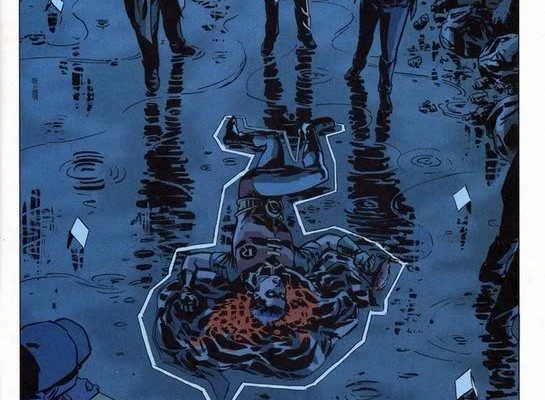
Gotham Central: The DCU Police Drama Everyone Should Have Read
 Whenever music cognoscenti talk about sixties art-rockers The Velvet Underground, there's a saying they like to throw around: "The Velvet Underground didn't sell that many records, but everyone who bought a record started their own band." Supposedly Brian Eno uttered it first, and since then it's been on a world tour through rock journalism. And like all good rock and roll polemic, it's fifty percent bull -- and fifty percent gospel truth.
Whenever music cognoscenti talk about sixties art-rockers The Velvet Underground, there's a saying they like to throw around: "The Velvet Underground didn't sell that many records, but everyone who bought a record started their own band." Supposedly Brian Eno uttered it first, and since then it's been on a world tour through rock journalism. And like all good rock and roll polemic, it's fifty percent bull -- and fifty percent gospel truth.
Something similar could be said about Gotham Central by Greg Rucka and Ed Brubaker. For forty issues GC turned mainstream comics upside-down, grabbing awards, the attention of nearly every reviewer, and the respect of every pro who read it. And it never once managed to reach the Top 100. With the entire series now in hardback, it's time to sift through the evidence and figure out why.
The best ideas are the most obvious ones, the ones that torture other creators because they didn't think of them. The foundation of Gotham Central is one of those ideas, a simple, obvious premise that was right in front of everybody's faces and still unseen: a police procedural set in the world of Gotham City. Batman plus Law & Order equals every other pro spitting a quiet dammit behind pursed lips. Yes, imaginary comics creator, you should have thought of that, but you didn't. That honor belongs to Greg Rucka and Ed Brubaker. I defy you to find a writing duo with more hard Rs in their names.While working together on the Batman crossover event Officer Down, the Rrrrs apparently recognized a kinship: a predilection and talent for hard-hitting crime fiction in the noir tradition, a willingness to push envelopes, and a strong commitment to technical accuracy. Just, you know, with superheroes. After planning and waiting nearly a year for the brilliant illustrator Michael Lark to free up his schedule, they hit the ground at top speed and launched Gotham Central.
 The immediacy of GC arrests you with the first panels. When comics aspired toward reality in the eighties, they did so with masks and capes. Though there are some great examples of "real world" books, they're all still focused on a ridiculous premise. With Gotham Central, the focus is GCPD's Major Crimes Unit. Cops. Real people. Not super-powered cops, not living weapons like Batman. Just vulnerable, soft pink flesh with drinking problems. By rooting its characters in a much closer relationship to the actual, real, for really real world, Gotham Central brings the reader much nearer to the story than any superhero book could.
The immediacy of GC arrests you with the first panels. When comics aspired toward reality in the eighties, they did so with masks and capes. Though there are some great examples of "real world" books, they're all still focused on a ridiculous premise. With Gotham Central, the focus is GCPD's Major Crimes Unit. Cops. Real people. Not super-powered cops, not living weapons like Batman. Just vulnerable, soft pink flesh with drinking problems. By rooting its characters in a much closer relationship to the actual, real, for really real world, Gotham Central brings the reader much nearer to the story than any superhero book could.
You're there, with the MCU. On ride-alongs and stakeouts, in the mundane routines of being a real police officer. You're there when reality suddenly turns upside-down and some freak with an ice-ray cuts a man down. The natural dialogue and serious adherence to actual police life won't let you go anywhere else as the scratchy realism of Michael Lark immerses you in the narrative. All the characters look like someone you've met, and move and react like real people do. You can tell when a room smells wet, or when the Crown Vic you're riding in shakes a little.
With Rucka writing the MCU's day shift and Brubaker taking the night shift, they established a large ensemble of some of the most fully-realized characters in comics, a rich cast of characters that rival any in TV drama. Police already make interesting character studies, and thrown into the dark world of Gotham City, they become men and women who talk like real cops and have problems like real people clashing with the un-reality of their own world.

What would a real cop think about Batman? How would a modern police force actually deal with threats like Two-Face, the Joker, or the occasional Crisis? If the police had a Bat-signal, wouldn't its use condone vigilantism? The imposition of human fragility and actual police procedure into the DC universe yielded fantastic results. The lushness of little details that make everything seem just a little bit closer to possible. Plots that shocked and twined and unwound between legal thrillers, murder mysteries, and hard noir. Stories that navigated the grim waters of crime and tragedy and heartbreak with a power that transcended superhero fiction while forever keeping one foot in the boat.
In one of the most fascinating story-lines, "Dead Robins" from in the Corrigan collection, literal dead Robins start popping up around Gotham as teenage boys dressed up as the Boy Wonder, dropped from buildings like confetti. Of course, supervillains are the prime suspects: Two-Face back for more attention from Renee Montoya, the Joker still giddy after a stint as sniper in the brilliant "Soft Targets" story. It turns out, though, [SPOILER ALERT] that the killer is just an average human being, a normal man enchanted by the lightshow of superheroics that constantly surround him in Gotham, a regular guy who desperately wants entrance into the world of heroes and villains, the lives of supermen.
 And comics readers are much the same way (hopefully not to the point where they torture and murder a gaggle of pubescent gymnasts), always looking for cracks in fiction's barrier, escape tunnels into the Valhalla of possibility that lives in every superhero story. Age, intelligence, and maturity mean absolutely nothing when it comes to this. We can all admit it: We want this world to be real. And the depiction of that other world truly never seemed as real as it did in Gotham Central.
And comics readers are much the same way (hopefully not to the point where they torture and murder a gaggle of pubescent gymnasts), always looking for cracks in fiction's barrier, escape tunnels into the Valhalla of possibility that lives in every superhero story. Age, intelligence, and maturity mean absolutely nothing when it comes to this. We can all admit it: We want this world to be real. And the depiction of that other world truly never seemed as real as it did in Gotham Central.
Like the Velvet Underground, Gotham Central had all the critical respect in the world without even approaching commercial success. Despite the love of seemingly every pro and reviewer extolling its quality, the series limped along in the sales charts for the entirety of its forty-issue run. It probably would have been canceled much sooner if not beloved by DC staffers. In fact, Rucka says DC was willing to continue publishing it, but after the departures of Lark and Brubaker, it simply didn't feel right. Whether it was canceled because of numbers or creative loyalty (probably both), it doesn't really matter. Everyone should have been reading this comic -- not just David S. Goyer while scripting The Dark Knight.
Of course, with the trade collections there have always been healthy sales. That seems to happen too often: great book doesn't sell, gets collected, and is finally discovered for the classic it is. Though it's immensely satisfying to see the hardcover editions on the shelves, old readers of Gotham Central can't avoid their own bitter-tasting what-if. What if it had been the commercial success it deserved to be, allowed to run for years with Rucka, Brubaker and Lark forever at the helm? And why? Why wasn't it the chart-topping smash it should have been?
Some cases just can't be solved.

More From ComicsAlliance









